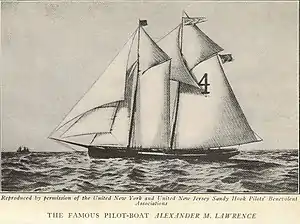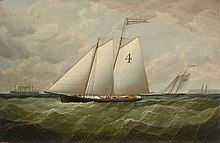Alexander M. Lawrence
Alexander M. Lawrence was the last of the 19th-century sailing schooners to be in the New York pilot boat service as a station boat.[2] She was one of the largest and fastest in the Sandy Hook fleet.[3] Her boat model won a medal at the 1893 Chicago World's Fair illustrating the perils of the pilot-boat service.[4][5]
 Alexander M. Lawrence | |
| History | |
|---|---|
| Name: | Alexander M. Lawrence |
| Owner: | N. Y. Pilots, Michael Murphy, H. B. Cogswell |
| Builder: | C. & R. Poillon shipyard, Brooklyn, New York |
| Cost: | $16,000 |
| Launched: | 21 May 1879 |
| Out of service: | 10 September 1897 |
| General characteristics | |
| Class and type: | schooner |
| Tonnage: | 87 Thames Measurement[1] |
| Length: | 97 ft 0 in (29.57 m) |
| Beam: | 22 ft 11 in (6.99 m) |
| Depth: | 9 ft 0 in (2.74 m) |
| Propulsion: | Sail |
| Sail plan: | 75 ft 6 in (23.01 m) |
| Notes: | Stern of white oak, with live oak aprons and hooks. Floors are double Maryland oak |
Construction and service
On May 21, 1879, the new 87-ton pilot-boat Alexander M. Lawrence was launched from the shipyard C. & R. Poillon in Brooklyn, New York at Bridge Street. She was built to take the place of the old Number 4, for Captain Michael Murphy. She was built by Cornelius & Richard Poillon based on a design by William Townsend who modelled the yachts Dreadnaught, Clio, Ariel, Peerless and others.[1]
On May 19, 1885, boatkeeper Sullivan reported that the Lawrence, No. 4, was about 20 miles east of Nantucket when a black whale ran headlong into the port bow of the vessel. None were hurt in the narrow escape of the Lawrence.[6]
The Lawrence was one of the representative pilot boats of the fleet and her pilot-boat model was exhibited by the Pilot Commission of New York at the 1893 Chicago World's Fair along with oil paintings illustrating the perils of the service. Her model won a medal at the Fair.[4][5]
In 1895, the pilot-boat Alexander M. Lawrence, Number 4 was on duty as a station boat when the first steam pilot-boat New York went into service near the Lightship Ambrose off Sandy Hook.[7]
On July 15, 1897, during a bad storm, the Alexander M. Lawrence, rescued the crew of the sinking Virginia sloop Fawn off the Sandy Hook lightvessel.[2]
Out of service
On September 10, 1897, the Alexander M. Lawrence was sold by the Pilots' Association to the Pacific Mining and Trading Company.[8]
Owners
Abraham Leggett

New York pilot-boat Abraham Leggett, No. 4, was built in 1870 and would later be replaced by the Alexander M. Lawrence. The Abraham Leggett, was built by Daniel Westervelt at the Westervelt & Co. shipyard at the East River in New York City.[11] She was listed in the Record of American and Foreign Shipping from 1876 to 1879 as 82 foot in length, 20.8 feet in breadth, 8.4 feet in depth, 55-tons with Michael Murphy was the ship's Master.[12]
On 3 February 1879, the Abraham Leggett was hit by the steamship Naples, when the pilot-boat came along the side of the steamer attempting to board her. The damage was so bad that the pilots abandon the pilot-boat and came on board the steamer.[2]:p20[13]
In 1879, the Alexander M. Lawrence, No. 4, was built to take the place of the old Abraham Leggett, No. 4, and was launched on May 21, 1879.[1]
References
- "The New Pilot Boat Alexander M. Lawrence for Admiral Murphy and His Partners". Times Union. Brooklyn, New York. 1879-05-21. Retrieved 2020-09-07.
- Allen, Edward L. (1922). Pilot Lore From sail to Steam. New York: The United New York and New Jersey Sandy Hook Pilots Benevolent Associations.
- Russell, Charles Edward (1929). From Sandy Hook to 62°. New York: Century Co.
- "Famous Pilot Boat Sold". The Morning Call. Allentown, Pennsylvania. 1897-08-17. Retrieved 2020-08-18.
- "A Fortnight With Pilots". The Brooklyn Citizen. Brooklyn, New York. 1895-11-17. p. 20. Retrieved 2020-08-18.
- "Run Into By A Whale. The Narrow Escape of the Pilot Boat Alexander M. Lawrence". The Buffalo Commercial. Buffalo, New York. 18 May 1885. p. 1. Retrieved 2020-09-07.
- Cunliffe, Tom (2001). Pilots, The World Of Pilotage Under Sail and Oar. Brooklin, Maine: WoodenBoat. p. 73.
- "Wharf And Wave". The Hawaiian Gazette. Honolulu, Hawaii. 1897-09-10. Retrieved 2020-08-18.
- "Index to Ship Registers 1881-1885". research.mysticseaport.org. Mystic seaport. Retrieved 2020-09-07.
- "Index to Ship Registers 1898-1900". research.mysticseaport.org. Mystic seaport. Retrieved 2020-09-07.
- "The American Yacht List: Containing a Complete Register of the Yacht Clubs, List of Pilot Boats, Port of New York". L. H. Biglow & Co. Printers And Stationers, 13 William Street. New York. 1874. Retrieved 1 September 2020.
- "Record of American and Foreign Shipping 1884". Mystic Seaport Museum. New York. Retrieved 2020-10-06.
- "Disasters". Boston Post. Boston, Massachusetts. 3 Feb 1879. p. 4.